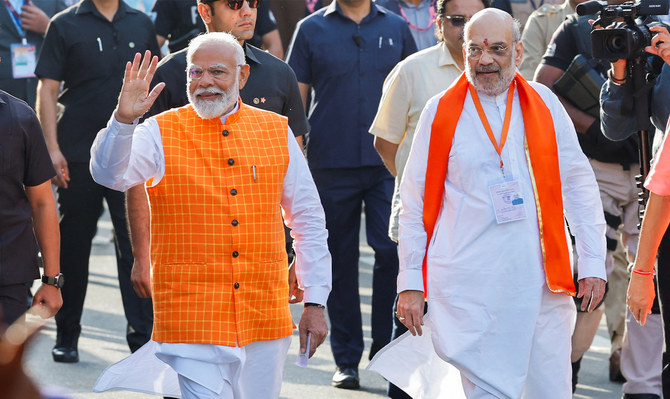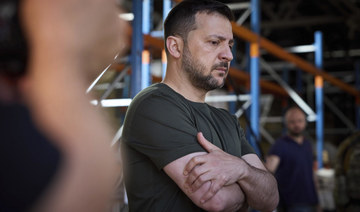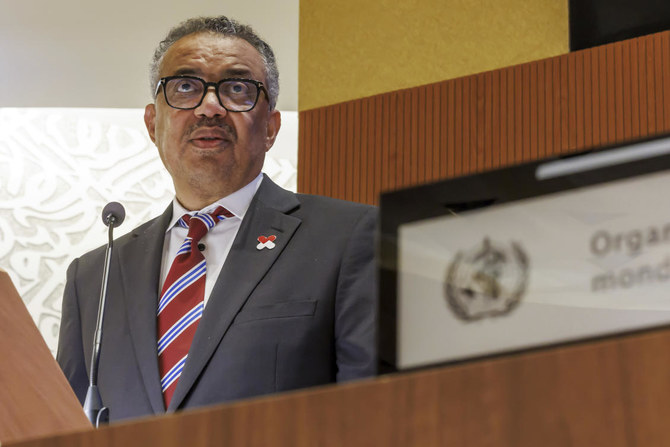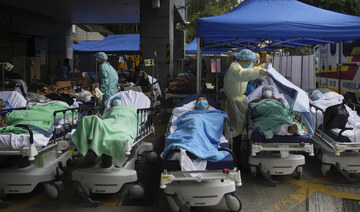BARPETA/THIRUVANANTHAPURAM, India: As India votes in a six-week general election, Narendra Modi’s image adorns everything from packs of rice handed out to the poor to large posters in cities and towns.
His Bharatiya Janata Party (BJP) is relying on the prime minister’s popularity as it seeks a super-majority in India’s parliament. Its message: Modi has delivered economic growth, infrastructure upgrades and India’s improved standing in the world.
But as the Hindu nationalist party and its allies target 400 of the 543 seats in India’s lower house of parliament — up from 352 won in 2019 — they are also employing local tactics in some vital constituencies they hope to wrest from the opposition.
Opinion polls indicate Modi will win a rare third term when voting ends on June 1. But only once in Indian history has a party crossed the 400 mark — when the center-left Congress party romped to victory following the assassination of its leader Indira Gandhi in 1984.
To examine how the right-wing National Democratic Alliance (NDA) aims to achieve that feat — and the obstacles it faces — Reuters spoke to nine NDA officials, three opposition leaders and two political analysts, as well as voters in six opposition-held seats the alliance is targeting.
They identified three of the BJP’s key tactics: enlisting celebrity candidates to unseat veteran opposition lawmakers; making an assault on the opposition’s southern strongholds by appealing to minorities such as Christians; and exploiting redrawn political boundaries that bolster the Hindu electorate in some opposition-controlled areas in the north.
“A combination of strategies, organizational commitment and tactical flexibility will help make inroads in seats never held by the party ever before,” BJP President J. P. Nadda, who oversees the party’s election strategy, told Reuters in April.
Some critics have warned the BJP would use a large majority to push through a more radical agenda in a third term. While the BJP’s manifesto focuses heavily on economic growth, it has also pledged to scrap separate legal codes for religious and tribal groups in areas such as marriage and inheritance.
Many Muslims and tribal groups oppose the plan, which would require a constitutional amendment to be passed by at least two-thirds of parliament.
“Modi wants a landslide majority only to be able to end the debate and deliberation on any policy matter in the parliament,” Congress party president Mallikarjun Kharge told Reuters.
Following low turnout in early voting, some BJP campaign officials have in recent days appeared less confident of securing a huge majority, though the party still expects to form the next government.
SOUTHERN STRATEGY
Modi’s party has criticized the dynastic politics that it says afflicts Congress, long dominated by the Nehru-Gandhi family. But in Pathanamthitta, a seat in the southern state of Kerala, it is fielding a political scion in Anil Antony — son of a veteran Congress leader.
The constituency, home to a sizeable Christian minority, has been held by Congress since its creation in 2009.
Anil’s father, former defense minister A.K. Antony, supports the incumbent and has denounced his son, a fellow Christian, for representing the Hindu nationalist party.
But Anil has another supporter: Modi, who came to Pathanamthitta in March and praised the BJP candidate for his “fresh vision and leadership.” The prime minister has visited the five states of southern India at least 16 times since December.
Nadda, the BJP president, acknowledged that winning a supermajority would require performing well in the five southern states, which are home to about 20 percent of India’s population but have not traditionally voted for his party.
In 2019, the NDA won just 31 of 130 seats across Andhra Pradesh, Karnataka, Kerala, Tamil Nadu and Telangana, all of which are linguistically diverse and have many Muslim and Christian voters.
Jiji Joseph, general secretary of the BJP’s minority wing in Kerala, said the party has made a concerted push for the 18 percent of voters there who are Christians. The BJP did not win a single seat in Kerala at the last general election.
“The BJP launched active contact with the Church and we started interacting with clergies directly,” he said, adding that the party now has 11,000 active Christian members. “There is a change. Christians now want to believe that BJP stands for them.”
In April, Anil became the first BJP candidate in Kerala to be endorsed by Christian leaders. He told Reuters his selection indicated the party offered opportunities to members from minority groups. He declined to comment on relations with his father.
Jayant Joseph, a Keralan Christian voter, said he backed the BJP because he had read media reports about Muslim men marrying Christian women and converting them to Islam. Most moderate Hindus consider allegations of large-scale forced conversions to be a conspiracy theory.
“Kerala is a secular state,” he said. “But for it to continue to be a secular state, the Muslim population and their conversion strategy must be kept under check.”
A Modi political aide, who spoke on condition of anonymity because he was not authorized to talk to media, said the NDA expects to win about 50 seats in the south.
K. Anil Kumar, a senior leader of Kerala’s ruling Communist Party of India (Marxist), said he did not believe BJP would do well in his state, which he said has a strong tradition of secularism.
“The BJP might try to side with the Christians on some issues but they are fundamentally a party of the Hindus and for the Hindus,” he said.
STAR CANDIDATES
In the Mandi constituency of the northern state of Himachal Pradesh, the BJP has recruited Bollywood actress Kangana Ranaut to break the Congress party’s grip on power. Congress is fielding as its candidate Vikramaditya Singh, whose mother currently represents the constituency. His father was the state’s long-time chief minister.
Ranaut, a political novice who calls herself a “glorious right-wing” personality, has starred in popular movies with nationalistic themes. She is known for her criticism of Bollywood executives who she said favored the relatives of famous actors for opportunities.
The actress is one of five actors running for the BJP this year, up from four in 2019.
No opinion polling on the Mandi race is publicly available.
Anjana Negia, an elementary school teacher who plans to vote for Ranaut, acknowledged that her preferred candidate had no political experience. But she said that she valued a new face and that a Modi-backed candidate would help “bring a fresh wave of development.”
Fielding celebrities and seeking the endorsement of entertainment personalities is relatively new for the BJP, which “long resisted such tactics because of its cadre-based nature” that prized grassroots efforts, said Milan Vaishnav, an expert on South Asian politics at the Carnegie Endowment for International Peace think-tank.
Ranaut declined an interview request. Federal BJP spokesman Shahzad Poonawala said she “has been successful in exposing dynastic culture and nepotism in Bollywood and now she is doing the same in politics.”
Singh, a state minister responsible for urban development, told Reuters that his family’s experiences gave him a better understanding of politics. Charges of nepotism were “shallow,” he said.
REDISTRICTING BENEFITS
The NDA is hoping for gains in the northeastern state of Assam, where it won nine of 14 seats in 2019. Assam’s BJP chief minister, Himanta Biswa Sarma, said in March he was confident of winning 13 seats.
The NDA’s confidence is rooted in a 2023 redistricting exercise in the state. India’s non-partisan Election Commission routinely redraws seat boundaries to reflect population changes; it is tasked with ensuring that no political party gains undue advantage from the changes.
But exercises since the last federal election in Assam and far-northern Jammu and Kashmir, India’s only majority Muslim region, diluted the Muslim vote in seats that the NDA is targeting, according to three BJP and four opposition officials.
The Election Commission declined to comment on the two exercises, citing the ongoing election.
In Assam, the NDA has high hopes for Congress-held Barpeta, which alliance candidate Phani Bhushan Choudhury said newly includes dozens of villages and some towns with large Hindu populations.
“Earlier (Barpeta) had a Muslim majority but now it is a Hindu majority,” said Choudhury. “That change has worked in my favor.”
He estimates that there are now 1.2 million Hindu voters in Barpeta, where he is campaigning on development and protecting the rights of what the NDA calls “indigenous Assamese” voters, who are mostly Hindu.
Choudhury’s Congress opponent Deep Bayan said the percentage of Hindus in Barpeta went from 30 percent to 70 percent. “Instead focusing on real issues affecting the people...(the BJP does) the politics of polarization,” he said.
Three of Jammu and Kashmir’s five seats are majority Muslim and held by the opposition. But the NDA hopes to swing one of them, Anantnag-Rajouri, after its voter rolls swelled by more than 50 percent to over 2 million, according to government data.
Many of the new voters are Hindus or from regional tribes — which benefited from new BJP policies awarding them education and employment privileges — according to regional BJP chief Ravinder Raina.
Raina said the BJP would support an NDA partner that it believed could win Anantnag-Rajouri and focus on retaining the two Hindu-majority seats it holds.
The two redistricting exercises presages a broader remapping of constituencies due after the election.
Vaishnav, of the Carnegie Endowment, said the remapping would distribute seats to the BJP-dominated north, which has much higher population growth rates, to the detriment of wealthier south India.

























